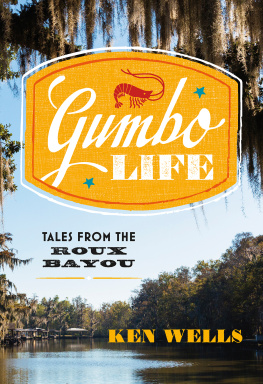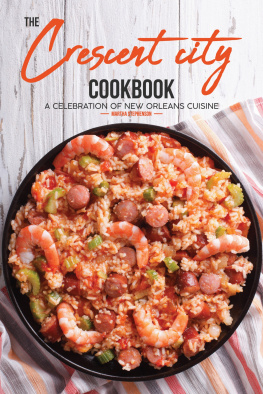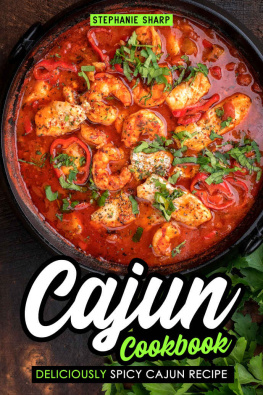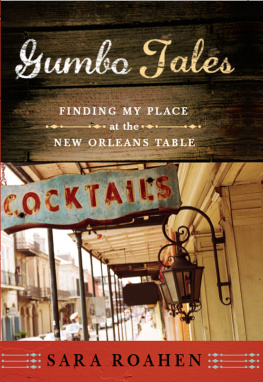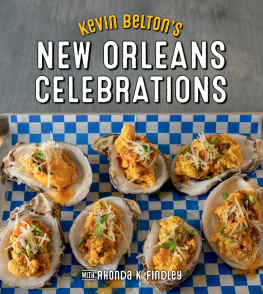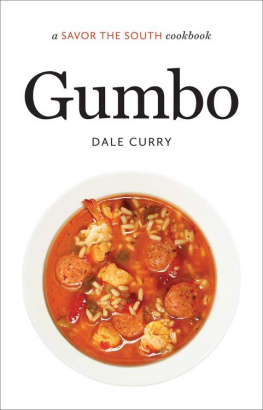Contents

GUMBO LIFE
Also by Ken Wells
NOVELS
Meely LaBauve
Juniors Leg
Logans Storm
Crawfish Mountain
Rascal: A Dog and His Boy
NONFICTION
Travels with Barley:
A Journey Through Beer Culture in America
The Good Pirates of the Forgotten Bayous: Fighting to Save a Way of Life in the Wake of Hurricane Katrina
GUMBO
LIFE
Tales from the Roux Bayou

KEN WELLS

W. W. Norton & Company
Independent Publishers Since 1923
New York London
Copyright 2019 by Ken Wells
All rights reserved
First Edition
For information about permission to reproduce selections from this book, write to
Permissions, W. W. Norton & Company, Inc., 500 Fifth Avenue, New York, NY 10110
For information about special discounts for bulk purchases, please contact
W. W. Norton Special Sales at specialsales@wwnorton.com or 800-233-4830
Book design by Michelle McMillian
Map by David Atkinson, handmademaps.com
Production manager: Beth Steidle
The Library of Congress has cataloged the printed edition as follows:
Names: Wells, Ken, author.
Title: Gumbo life : tales from the Roux Bayou / Ken Wells.
Description: First edition. | New York : W. W. Norton & Company, independent publishers
since 1923, 2019. | Includes bibliographical references and index.
Identifiers: LCCN 2018048425 | ISBN 9780393254839 (hardcover)
Subjects: LCSH: Gumbo (Soup)History. | Cooking, Acadian. | Wells, KenTravel. |
LouisianaSocial life and customs.
Classification: LCC TX757 .W43 2019 | DDC 641.81/3dc23
LC record available at https://lccn.loc.gov/2018048425
ISBN: 9780393254846 (ebk.)
W. W. Norton & Company, Inc., 500 Fifth Avenue, New York, N.Y. 10110
www.wwnorton.com
W. W. Norton & Company Ltd., 15 Carlisle Street, London W1D 3BS
To my parents,
Bonnie and Rex,
who gave me the gift of the Gumbo Life.
You are gone but never forgotten.
And to my late lamented Louisiana friends, the Louie Brothers
Delbert Louis Leggett (19502016)
Jerry Louis Hermann (19532017)
with whom I shared not just a middle name, but almost five decades
of irreplaceable friendship, often over bowls of gumbo.
I sorely miss your camaraderie, good humor,
and arch observations of all things Louisiana.
Rest you, my brothers.
CONTENTS
People of the Region
Cajun An Anglicized shortening of the word Acadian. It refers to the descendants of pioneers principally from the Poitou-Charentes and Vende regions of west-central France who settled Acadie, the French-controlled Maritime Provinces of eastern Canada beginning in the early 1600s. After about 150 mostly peaceful years there, les Acadiens, as they called themselves, were swept up in the nine-year territorial battle between the British and French known as the French and Indian War. Though taking no sides in the conflict, the Roman Catholic Acadians drew the suspicions of the British because of their reluctance to take a loyalty oath to the English and their Protestant king. It didnt help that the Acadians sat on some of the richest farmland in all of Canada, which the British coveted for the British settlers they hoped to coax there. In 1755, the British began confiscating and burning Acadian farmsteads and sending Acadians into exile to other colonies aboard cargo ships, where they languished under deplorable conditions. Families were often separated and almost half of the twelve thousand Acadian deportees died. This act of ethnic cleansing is known as the Le Grand Drangement. Clusters of survivors began arriving between 1763 and 1776 in the Louisiana territories, recently ceded to Spain by France, but which supported a robust and sympathetic French-speaking culture. The Cajuns would settle the remote bayous, swamps, and prairies of South Louisiana and live in relative isolation. Their culture, music, and antique French remained largely intact until the acculturation pressures following World War I and escalating after World War II. The French they speak, known today as Cajun French, is essentially eighteenth-century country French derived from colonial French, with borrowings from Spanish, Native American, and English forms. Cajun French has been preserved by its long isolation in both Canada and colonial Louisiana.
Creole A term of complicated etymology. Of Portuguese and Spanish origins, the word in colonial Louisiana was originally used by French-speaking, Louisiana-born descendants of continental French and Spanish settlers to distinguish themselves from newly arrived French and Spanish speakers coming from the Francophone and Afro-Hispanic Caribbean. Creole planters also applied the term to their Louisiana-born slaves. These days, Creole more commonly applies to mixed-race peoples whose lineage may include any amalgam of European colonists, Native Americans, African Americans, and Afro-Caribbean peoples, descending both from slaves and free people of color. Binding them today is a language known as Creole French, which is derived from the more widely spoken colonial French that came with the first French settlers from Europe, as well as from the dialects that emerged as Afro-Creoles and Afro-Caribbeans began to mix. Creole French, like its cousin, Cajun French, is kept alive by diminishing communities of speakers still determined to preserve it. One pop culture footnote: Zydeco, the Creolized, amped-up interpretation of the Cajun music repertoire, is sung in Creole French (and these days in English) while traditional Cajun music is typically sung in Cajun French.
Geography and Culture
bayou A shallow, slow-moving, usually serpentine natural waterway, typically larger than a creek and smaller than a river, and often coursing through marshlands or swamplands. In Louisiana, some, like Bayou Teche, encompass more than 120 miles. Bayous attracted Louisianas early settlers because they were full of harvestable fish and game, and served as transportation routes in the absence of roads. Even better, the bayou banks, formed by silt from millennia of floods, provided habitable high ground in a place where high ground was rare. Thus, the term bayou today has been expanded to include entire communities. Bayou Black, where I grew up, is a perfect example: It is a small town formed not around a center, but which stretches for twenty miles along opposing banks of the bayou from which it takes its name.
boucherie A Cajun/Creole ritual involving the communal slaughtering and smoking of hogs and cattle. Colonial-era boucheries, carried out principally by Acadian and German settlers, were a necessity to preserve meat in the days before refrigeration. These days, boucheries are more often than not a feature of festivals throughout South Louisiana.
Gumbo Belt Principally, the twenty-two contiguous south Louisiana parishes that form the heart of Francophone Louisiana and still hold the vast majority of the states French-speaking Cajuns and Creoles and gumbo cookers.
pirogue (PEE-rawg, alternatively PEE-roe) A Cajunized adaptation of the Native American dugout canoe. Its a wooden or fiberglass boat, typically twelve to sixteen feet long, propelled by paddling and made for navigating in shallow water. The vessel remains popular with modern-day hunters and fishermen.

